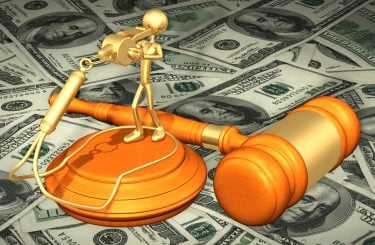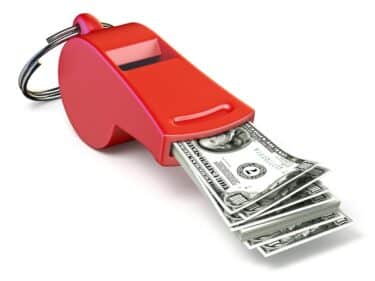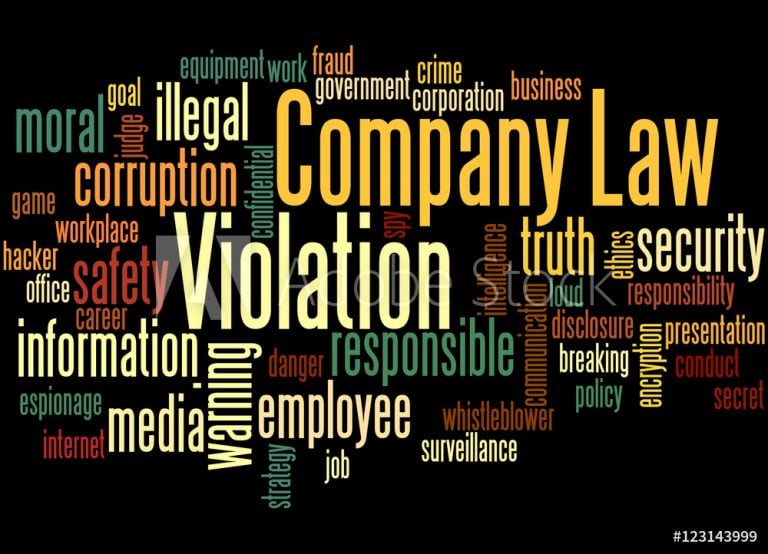SEC Sanctions and Penalties
The U.S. Securities and Exchange Commission (SEC) obtains billions of dollars each year in monetary sanctions for violations of the federal securities laws. An enforcement action resolving charges typically requires the wrongdoer to provide the following relief:
- Disgorge, or pay back, ill-gotten gains in order to return the funds to harmed investors;
- Pay civil monetary penalties (see the calculation of civil monetary penalties); and
- Pay interest (prejudgement and potentially postjudgement).

Since 2011, the SEC’s Office of the Whistleblower has paid more than $2 billion in awards to whistleblowers, which includes multi-million dollar awards paid to our clients. The largest SEC whistleblower awards to date are:
- $279 million SEC whistleblower award (May 5, 2023)
- $114 million SEC whistleblower award (October 22, 2020)
- $110 million SEC whistleblower award (September 15, 2021)
To find out if you may qualify for an SEC whistleblower award, contact leading whistleblower law firm Zuckerman Law at 202-930-5901 or email us at [email protected]. We represent whistleblowers worldwide. Our clients’ SEC whistleblower tips have helped the SEC halt more than $1 billion in fraudulent investment schemes and we have obtained awards for clients reporting a variety of securities law violations.






Year-By-Year Total SEC Sanctions Since FY ’04
Annually, the SEC announces the total monetary sanctions obtained from successful enforcement actions. The table below identifies the total illegal profits that securities violators were required to disgorge and the total penalties they were required to pay.
| Fiscal Year | Disgorgement | Penalties |
|---|---|---|
| 2024 | $6.092 billion | $2.102 billion |
| 2023 | $3.369 billion | $1.580 billion |
| 2022 | $2.245 billion | $4.194 billion |
| 2021 | $2.395 billion | $1.456 billion |
| 2020 | $3.589 billion | $1.091 billion |
| 2019 | $3.248 billion | $1.101 billion |
| 2018 | $2.506 billion | $1.439 billion |
| 2017 | $2.957 billion | $832 million |
| 2016 | $2.809 billion | $1.273 billion |
| 2015 | $3.019 billion | $1.175 billion |
| 2014 | $4.16 billion total | $4.16 billion total |
| 2013 | $2.257 billion | $1.167 billion |
| 2012 | $2.083 billion | $1.021 billion |
| 2011 | $1.878 billion | $928 million |
| 2010 | $1.82 billion | $1.03 billion |
| 2009 | $2.09 billion | $345 million |
| 2008 | $774 million | $256 million |
| 2007 | $1.093 billion | $507 million |
| 2006 | $2.3 billion | $975 million |
| 2005 | $1.6 billion | $1.5 billion |
| 2004 | $1.9 billion | $1.2 billion |
For more information about SEC sanctions, see a recent speech by the SEC’s Division of Enforcement: Remedies and Relief in SEC Enforcement Actions.
SEC Whistleblower Program

In its short history, the SEC Whistleblower Program has had a tremendous impact on securities enforcement. Since the inception of the program in August 2011, the SEC has received more than 100,000 whistleblower tips, some of which have enabled the SEC to order more than $6.3 billion in monetary sanctions from wrongdoers. According to the SEC Office of the Whistleblower’s annual report, the SEC received nearly 25,000 tips in FY 2024. The most common complaint categories reported by whistleblowers were Manipulation (37%), Offering Fraud (21%), Initial Coin Offerings and Cryptocurrencies (8%), and Corporate Disclosures and Financials (8%). See some of the SEC whistleblower cases that have resulted in large awards.
For more information about the SEC Whistleblower Program, download the eBook: SEC Whistleblower Program: Tips from SEC Whistleblower Attorneys to Maximize an SEC Whistleblower Award.
Violations Leading to SEC Sanctions
A tip about any violation of U.S. federal securities laws may qualify a whistleblower for an award under the SEC Whistleblower Program, including:
- Accounting fraud;
- Investment and securities fraud;
- Insider trading;
- Foreign bribery and other FCPA violations;
- EB-5 investment fraud;
- Manipulation of a security’s price or volume;
- Fraudulent securities offerings and Ponzi schemes;
- Hedge fund fraud;
- Unregistered securities offerings;
- Investment adviser fraud;
- Broker-dealer anti-money laundering program violations;
- False or misleading statements about a company or investment;
- Inadequate internal controls;
- Deceptive non-GAAP financial measures;
- Improper revenue recognition;
- Violations of auditor independence rules; and
- Blockchain fraud.
Tier-1 Law Firm Representing SEC Whistleblowers
If you would like more information on the SEC Whistleblower Program, contact an SEC Whistleblower Attorney at Zuckerman Law for a free, confidential consultation. Zuckerman Law is one of the nation’s leading law firms representing whistleblowers in whistleblower rewards and retaliation cases.
As less than half of one percent of SEC whistleblower tips result in the payment of a whistleblower award, having an experienced SEC whistleblower attorney prepare a thorough TCR whistleblower submission, protect your interests at the SEC, and prepare a detailed award application can significantly increase your chance of obtaining an award.






SEC Whistleblower Lawyers
Click below to hear SEC whistleblower lawyer Matt Stock‘s tips for SEC whistleblowers:
How to Qualify for an SEC Whistleblower Award
- See our column in Forbes: One Billion Reasons Why The SEC Whistleblower-Reward Program Is Effective.
- See our column in Going Concern: Sarbanes-Oxley 15 Years Later: Accountants Need to Speak Up Now More Than Ever.
- See our post in Accounting Today: Whistleblower Protections and Incentives for Auditors and Accountants.
- See our post in The Compliance and Ethics Blog: Shkreli Trial Reveals the Challenges Faced by Compliance Whistleblowers.




